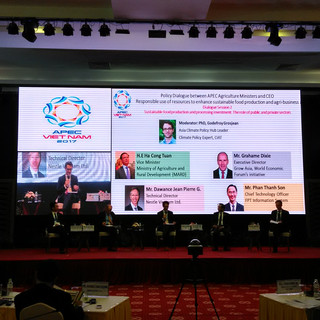Thoughts from APEC 2017 Food Security Week
- Aug 28, 2017
- 2 min read
CAN THO, VIET NAM – Last week, I had the privilege of attending the Asia-Pacific Economic Cooperation (APEC) 2017 Food Security Week and High-Level Policy Dialogues in Can Tho – aptly in the largest city of the Mekong Delta, the “Rice Basket of Vietnam”, which supplies more than 90% of the nation’s rice, 50% of seafood and other agro-forestry-fishery exports.
Framing the discussions were the twin challenges of food security and climate change. How do we feed 9 billion people in the world by 2050? How do we address the related and complex nutritional challenges that sees nearly 800 million people suffer from chronic hunger, over 2 billion from “hidden hunger” of micronutrient deficiencies, while 600 million people are obese? At the same time, climatic changes will affect our ability to produce food. The increased demand and reduced supply could translate into 20-40% higher food prices by 2050.
Listening and speaking with the delegates, I was struck by common themes that surfaced:
1. Adapting to climate change – Economies are under pressure to manage natural resources in a sustainable way and produce more with less. Delegates agreed to promote policies, programs and best practices which will enable climate-resilience, water and energy efficiency, biodiversity conservation and sustainable growth.
2. Harnessing technology – Science holds the potential to bridge the supply gap. Biotechnologies can be used as tools to enhance productivity while mitigating the impact of climate change. Digital was also mentioned as a way to reach scale and lower the cost of engaging with smallholders. However, just as Kranzberg’s First Law of Technology states that “Technology is neither good nor bad; nor is it neutral”, if not done correctly with the right regulatory framework, the advances of technology could also widen the economic gap.
3. Transforming agricultural systems – A vibrant agricultural sector is often the basis for successful economic transformation. Many developing countries are on the pathway to such a transformation which favours capital and knowledge intensive agriculture and larger holdings. This inevitably means having winners and those that are left behind and unable to compete. Policymakers can support with incentives and policies that help farmers and SMEs adapt, empower women and indigenous populations, and encourage sustainable rural-urban development.
How do we get there?
Encouragingly, partnerships seem to be the answer. APEC member economies promoted trade facilitation, greater connectivity and market linkages with one another.
Delegates called for “win-win” partnerships with the private sector to develop successful business models that advance food security, reduce poverty, fight hunger, and improve nutrition. We need an ecosystem approach that provides a suite of complementary solutions, such as rural extension, access to finance, harmonization of standards and new technologies. This will allow us to create an environment that strengthens and engages smallholders and rural organizations to be active participants of agricultural transformation and adapt to climate change.











